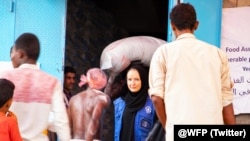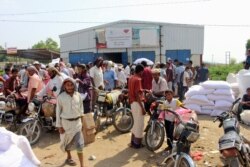The head of the World Food Program said Thursday that his agency is close to reaching agreement with Houthi rebel leaders to end a suspension of food aid in areas of Yemen that the group controls.
“As of this moment, we have an agreement in principle, but it is not a signed agreement as of yet,” David Beasley, Executive Director of WFP told a U.N. Security Council meeting on Yemen. “But once it is resolved we are ready to begin implementing this agreement immediately. We will have food back on the streets in Sana'a in a matter of just days.”
Last month, Beasley ordered a partial suspension of food distribution in the capital, Sana'a, which is controlled by Houthi rebels. He said it was necessary because the rebels were diverting aid for profit and not allowing aid agencies to operate independently.
The suspension affected about 850,000 people. Programs for malnourished children and pregnant and nursing mothers in those areas were allowed to continue.
“While this agreement will help ensure the right people get the food, it will also allow the accountability framework required to start cash programs,” Beasley said. “Cash will help stimulate the local economy and help stabilize the riyal which will have a multiplier effect bringing benefits to everyone in Yemen, not just the 12 million that we are providing assistance to on a daily basis.”
More than two-thirds of Yemen’s 30 million population are food insecure, of which 10 million are severely food insecure. The U.N. says 14 million people are in acute need and another 10 million require some form of humanitarian assistance or protection. Millions of them live in Houthi-controlled areas in the west and northwest of the country.
Yemen is the U.N.'s largest humanitarian operation, but it is severely underfunded. Of the $4.19 billion needed for 2019, only 34% has been received.
“We are reaching the point where no amount of money will truly alleviate the suffering of the Yemeni people,” Beasley warned. “But when war destroys everything – lives, livelihoods, economies -- there is only so much we can do. We are fast approaching those limits.”
A Saudi Arabian-led coalition began bombing Iranian-aligned Houthi rebels in support of Yemen’s government in March 2015. Since then, the U.N. estimates more than 10,000 people have been killed, mostly due to coalition airstrikes.





